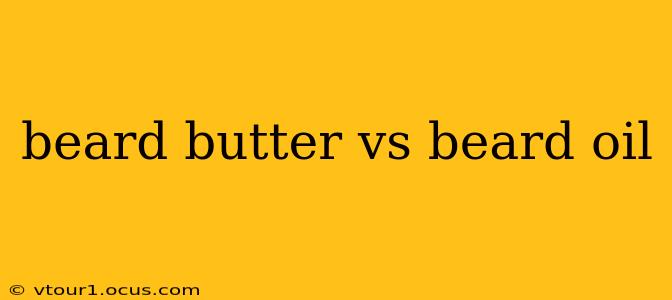Choosing between beard butter and beard oil can feel like navigating a dense forest of grooming products. Both aim to soften, condition, and tame your beard, but they achieve this in different ways, making the "better" choice entirely dependent on your beard's needs and your personal preferences. This comprehensive guide will break down the key differences, helping you make an informed decision.
What is Beard Oil?
Beard oil is a lightweight, fast-absorbing product typically composed of carrier oils (like jojoba, argan, or grapeseed oil) and essential oils for fragrance and added benefits. Its primary function is to moisturize the skin underneath the beard and condition the beard hairs themselves, preventing dryness, itchiness, and breakage. It's generally best suited for shorter to medium-length beards and those with less coarse hair.
What is Beard Butter?
Beard butter is a thicker, more emollient product. It's often a blend of butters (like shea or mango butter), oils, and sometimes beeswax or other waxes for added hold and texture. Beard butter provides deeper conditioning and moisturizing than beard oil, offering more protection against the elements and leaving the beard feeling softer and more manageable. It's ideal for longer, thicker, or coarser beards that need more intense hydration and styling support.
Beard Butter vs. Beard Oil: A Detailed Comparison
| Feature | Beard Oil | Beard Butter |
|---|---|---|
| Consistency | Lightweight, liquid | Thick, creamy |
| Absorption | Fast | Slower |
| Hydration | Moderate | Deep |
| Hold/Styling | Minimal | Moderate to High |
| Best for | Shorter, finer beards; daily hydration | Longer, coarser beards; styling and hold |
| Scent | Often stronger, more prominent | Can be strong, but often more subtle |
| Skin Benefits | Moisturizes underlying skin | Moisturizes and protects underlying skin |
Which is Better for My Beard Type?
This is the million-dollar question, and the answer depends on your specific situation:
-
Short, fine beards: Beard oil is generally sufficient for hydration and conditioning. The lightweight formula won't weigh down delicate hairs.
-
Medium-length beards: Both beard oil and beard butter can work well. Choose beard butter if you desire more conditioning or want some light styling control.
-
Long, thick, coarse beards: Beard butter is usually the better choice due to its deep moisturizing and styling properties. It tackles dryness and helps manage unruly hairs.
How Often Should I Use Beard Butter or Beard Oil?
The frequency of application depends on your beard's needs and the climate. In drier climates or during winter months, you might apply it daily. In humid climates or during summer, every other day might suffice. Start with daily application and adjust based on your beard's response.
Can I Use Beard Butter and Beard Oil Together?
Absolutely! Many beard enthusiasts use both products in a layering technique. Applying beard oil first provides a base layer of hydration, followed by beard butter for extra conditioning and hold. This is especially beneficial for long, coarse beards.
What are the Common Ingredients in Beard Butter and Beard Oil?
Beard Oil: Common carrier oils include argan oil, jojoba oil, grapeseed oil, almond oil, and avocado oil. Essential oils like tea tree oil, lavender oil, and cedarwood oil are frequently added for fragrance and their potential skin benefits.
Beard Butter: Typical ingredients include shea butter, mango butter, cocoa butter, coconut oil, beeswax, and various essential oils for fragrance.
Are there any side effects to using beard butter or beard oil?
While generally safe, some individuals might experience allergic reactions to certain ingredients. If you have sensitive skin, perform a patch test before applying the product to your entire beard. Choose products with natural ingredients and avoid those containing harsh chemicals or artificial fragrances.
By understanding the nuances of beard butter and beard oil, you can choose the best product to keep your beard healthy, happy, and looking its best. Remember to always consider your beard type and personal preferences to make the most informed decision.
